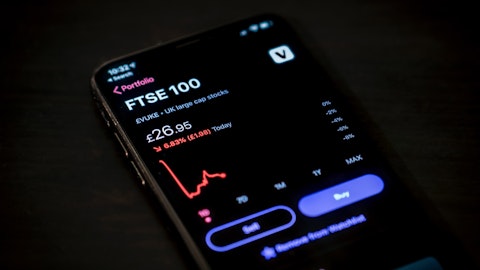So given the diversified portfolio we have obviously anchored obviously in resorts and leisure, but certainly very strong on the group side as well. And as business transient continues to recover none of us know ultimately where that’s going to set up, I like our positioning as we look to 2024 and beyond.
Dany Asad: Very helpful. Thank you for that. And then in the prepared remarks we talked about we’re back to pre-COVID target levels for dividend payouts. It looks like Casa Marina and Bonnet Creek are looking for year-end completion. So look beyond that how should we think about just the mix of capital allocation ROI projects, capital needs, going forward afterwards?
Tom Baltimore: We’ve historically been in that say $200-plus million range obviously pre-pandemic. You’ll see this ramp that up a little as we continue to take advantage of these strategic ROI projects. And as Sean noted, you can expect obviously AFFO payout to be in that two-thirds. We’re quite proud and we hope shareholders are pleased as well. And we’re returning over $625 million in return of capital this year. Sizable, it’s significant. And you can expect that the Park team is laser focused on continuing to create value for shareholders as we move forward.
Dany Asad: Thank you very much.
Operator: Thank you. Our next question is coming from Bill Crow with Raymond James. Please proceed with your question.
Bill Crow: Hey, good morning, guys.
Thomas Baltimore: Good morning.
Bill Crow: Couple of questions. First of all, it looks like your Chicago assets benefited to the tune of about $10 million from kind of property tax benefits and back to business payments. Was that in prior guidance? I don’t recall discussing that last quarter.
Sean Dell’Orto: No. Bill, it was not in prior guidance. I certainly don’t know what the outcomes are going to be.
Bill Crow: Okay. And then the second question is more philosophical in New Orleans. And I’m just wondering, you said that group up 11% next year which is terrific, but it’s coming off of a really, really low base. And is that a market Tom that is facing more secular than cyclical challenges you think? And as we think about the West Coast markets is it one of those markets that’s just kind of maybe losing something to the new markets the Austin and the Nashvilles and Miamis and whatnot.
Thomas Baltimore: It’s a fair question Bill. Just a couple of points of clarification, based on what we see on room nights and citywides in New Orleans is about 450,000 in 2023 and looking at about 505,000 510,000 next year. So it’s not as bad a base. I would say obviously, third quarter there were no citywide. So hence, the reason it was softer there. It’s a complex market. You do have the Harris converting to Caesars. You have significant investment being done there, particularly around the water. You’ve got obviously the mall has a new owner adjacent to our complex there the convention center is putting in I think about $550 million in improvements. It’s historically as you know been a strong leisure, it’s been a strong convention market, its gap has always been in the corporate side.
That certainly would help. But I’m more encouraged, it’s pro growth, not labor is reasonably priced and it doesn’t have the same challenges as we see in some of those other cities that I know you’re referring to. So we’re cautiously optimistic. And whether that’s a long-term hold for us, we’ll see, but we certainly don’t see the secular challenges there that I think we’re seeing in some of the other cities.
Bill Crow: Yeah. Okay. Tom, I’ve been doing this for a while. I don’t think I’ve ever said this but congratulations on the default. And with that I’m done.
Thomas Baltimore: Bill, I appreciate that. The team appreciates. As I said in our June prepared statement and then follow-up meetings, difficult but necessary and to get it to where it is today from June to early November was just working around the clock to get to the right outcome. And I think we got to the right outcome moving forward for Park, our shareholders and San Francisco will recover. It’s just going to take many years and Park couldn’t wait anymore and we couldn’t afford to continue to carry those two hotels as you know.
Bill Crow: Yeah. Thanks a lot. I appreciate it.
Thomas Baltimore: Thank you.
Operator: Thank you. The next question is coming from Dori Kesten with Wells Fargo. Please proceed with your question.
Thomas Baltimore: Hi, Dori.
Dori Kesten: Hey, guys. Can you do a full bridge on the old EBITDA guide to the new just addressing what you thought San Francisco EBITDA would be November December and then Chicago property tax that Bill just noted anything else?
Sean Dell’Orto: So relative to the prior guidance we gave in August, we had thought at the San Francisco would pretty much be about breakeven. So I wouldn’t say it’s really an impact — a notable impact as we think about updating for our guidance this go around. In terms of Chicago, we did not as I mentioned but we did not have that in our guidance. That was certainly a combination of an appeal that affected prior year 2022 as well as allowing us to catch up this year in our accruals for a property tax there. So that was to the tune of — I think it was about $5 million versus prior year and then the rest was kind of catch-up I think Bill noted about $10 million total, which is about accurate.
Dori Kesten: Okay. And there was nothing else then?
Sean Dell’Orto: No.
Dori Kesten: Okay. And then I know it’s early for 2024, but just very broadly between business transient group and leisure, which do you think would be your strongest revenue growth engine next year?
Sean Dell’Orto: I mean, certainly group for us. We like 18% pace right now. Again with some addition, I think we’re about — our mix is about 200 basis points less than it was in 2019. So I think again room for improvement. Leisure again just given the discussions around Hawaii remains strong on top of that Casa coming back and a lot of excitement from people who are looking to return back to the resort there. So hard to kind of really set it, I think they’re all three going in the right direction for us.
Tom Baltimore: Dori, I think it’s one of the benefits of a diversified portfolio. So I would say we lean forward a little bit on the group through all the reasons that we’ve outlined, but leisure again given Orlando, given Key West, given Hawaii expect also to be strong and for business transient and urban to be recovering. So that certainly would lag a little bit and perhaps be a little slower. But I think that’s one of the real benefits of the growth profile of Park as we move forward.



